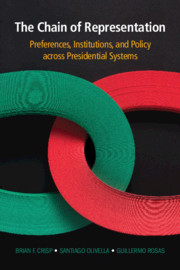Refine search
Actions for selected content:
5 results
3 - Stage 1: Citizens’ Preferences
- from Part I - Stages
-
- Book:
- The Chain of Representation
- Published online:
- 10 January 2020
- Print publication:
- 19 March 2020, pp 33-51
-
- Chapter
- Export citation
1 - Studying the Chain of Representation
-
- Book:
- The Chain of Representation
- Published online:
- 10 January 2020
- Print publication:
- 19 March 2020, pp 1-17
-
- Chapter
- Export citation
4 - Stage 2: Policy-Makers’ Preferences
- from Part I - Stages
-
- Book:
- The Chain of Representation
- Published online:
- 10 January 2020
- Print publication:
- 19 March 2020, pp 52-76
-
- Chapter
- Export citation
12 - A Chain Is Only as Strong as Its Weakest Link
- from Part III - Testing the Chain of Representation
-
- Book:
- The Chain of Representation
- Published online:
- 10 January 2020
- Print publication:
- 19 March 2020, pp 229-240
-
- Chapter
- Export citation

The Chain of Representation
- Preferences, Institutions, and Policy across Presidential Systems
-
- Published online:
- 10 January 2020
- Print publication:
- 19 March 2020
